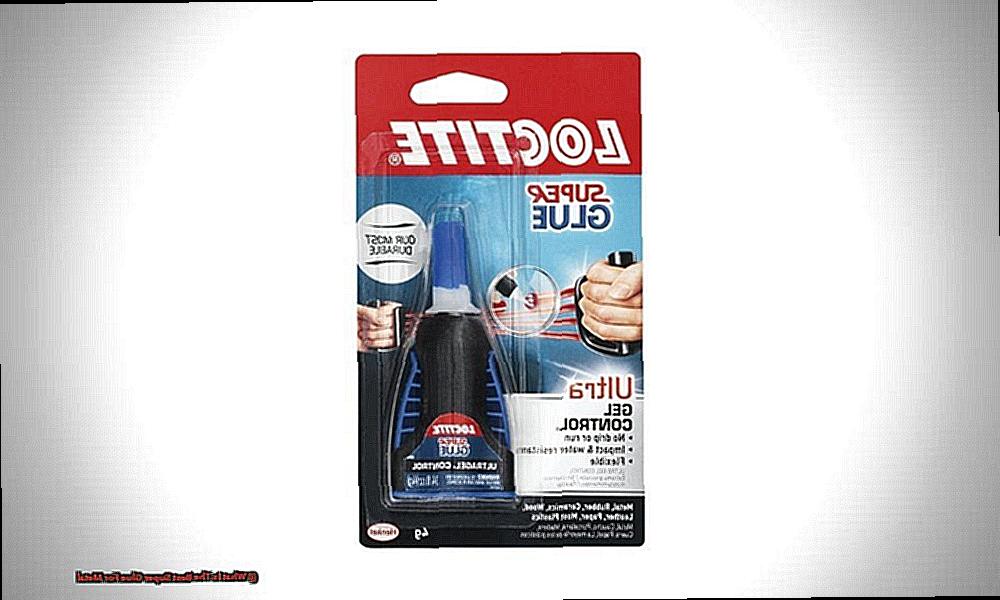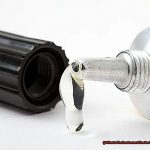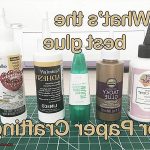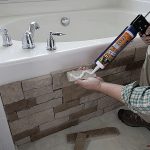Sick of your favorite metal jewelry falling apart? Or maybe that vintage kitchen utensil that’s been in your family for ages is crying out for some TLC.
Well, fret no more because I’m about to introduce you to the holy grail of super glues for metal. Whether you’re a DIY guru or just someone who wants to mend things without the headache, this glue is an absolute game-changer.
It’s a versatile adhesive that can bond different metals together and repair all sorts of broken metal items. Say goodbye to wasting time and money on subpar fixes.
So grab your trusty metal items and prepare to meet your new fix-it ally.
What Type of Metal Should You Use Super Glue On?
Contents
- 1 What Type of Metal Should You Use Super Glue On?
- 2 What Are the Most Important Factors to Consider When Choosing a Super Glue for Metal?
- 3 Strength of the Super Glue
- 4 Temperature Resistance
- 5 Drying Time and Curing Process
- 6 Compatibility with Other Materials
- 7 Top-Rated Super Glues for Metal
- 8 Conclusion
When it comes to bonding metal, using the right adhesive is crucial for achieving a strong and durable bond. Super glue, also known as cyanoacrylate adhesive, is a versatile option for bonding various materials, including metal. However, not all metals are created equal, and it’s important to choose the right type of super glue for optimal results. In this comprehensive guide, we will explore the factors to consider when selecting a super glue for metal and recommend some top-rated options.
Factors to Consider:
Metal Type:
- Super glue is generally suitable for non-porous metals with smooth surfaces such as steel, aluminum, and copper.
- Porous metals like cast iron, brass, and bronze may not provide an ideal bonding surface for super glue due to their rough surfaces or small holes/gaps.
- For porous metals, it is recommended to use adhesives specifically designed for such materials.
Surface Preparation:
- Ensure that the metal surface is clean and free from contaminants like oil, grease, or paint before applying super glue.
- Some metals may have special coatings or finishes that can affect the bonding ability of the adhesive. It is advisable to test the glue on a small area first.
Strength and Durability:
Temperature Resistance:
Drying Time and Curing Process:
- Depending on your project requirements, select a super glue with a drying time and curing process that aligns with your needs.
- Quick-drying and fast-curing glues are suitable for time-sensitive projects.
Compatibility with Other Materials:
Top-Rated Super Glues for Metal:
Loctite Ultra Gel Control Super Glue:
- Offers high strength and impact resistance.
- Can bond a variety of metals, including steel, aluminum, and copper.
- Excellent temperature resistance.
- Ideal for vertical applications due to its gel consistency.
Gorilla Super Glue Gel:
- Provides a strong bond on non-porous metals.
- Dries in seconds and offers high strength.
- Can withstand extreme temperatures.
- Suitable for both indoor and outdoor use.
J-B Weld 8265S Original Cold-Weld Steel Reinforced Epoxy:
- Perfect for bonding steel and other metals.
- Offers superior tensile strength and impact resistance.
- Can be used on both porous and non-porous metal surfaces.
- Withstands extreme temperatures and is resistant to chemicals.
What Are the Most Important Factors to Consider When Choosing a Super Glue for Metal?
First and foremost, adhesive strength is key. Metal surfaces can be smooth and slippery, so you need a super glue that is specifically designed for metal bonding. Look for glues labeled as “metal bonding” or “metal-specific” to ensure a strong and reliable bond.
Next, consider the cure time of the glue. Some super glues dry quickly within seconds, while others may take longer to completely cure. When working with metal, it’s crucial to give the glue enough time to bond securely. You don’t want your project falling apart as soon as you apply pressure.
Temperature resistance is another vital factor to consider. Metals can expand and contract with temperature changes, so you need a super glue that can withstand these fluctuations without losing its adhesive properties. Look for glues labeled as “temperature-resistant” or “heat-resistant” to ensure your bond stays intact in any weather condition.
Flexibility is also important when it comes to metal bonding. Metal surfaces often experience vibrations or movements, so using a flexible super glue will prevent your bond from cracking or breaking under stress. Look for glues that offer flexibility or are labeled as “flexible” to ensure a long-lasting bond.
Consider the application method of the super glue. Some glues come in tubes with nozzles for precise application, while others have brush applicators or are in gel form. Choose a glue that suits your preferred application method and allows you to apply the adhesive accurately and efficiently.
Lastly, drying time matters. Some super glues dry instantly, while others may require additional time to reach their maximum strength. Choose a glue that aligns with your project requirements and gives you enough time to position and adjust the metal parts before the adhesive sets.
Strength of the Super Glue
When it comes to the strength of super glue, it’s like having a superhero by your side. Super glue, also known as cyanoacrylate adhesive, is renowned for its incredibly powerful bond. But what gives it this exceptional strength?
The secret lies in its chemical composition and the way it reacts with surfaces. When super glue encounters moisture, a remarkable chemical reaction takes place. This reaction forms robust bonds between the molecules of the glue and the surface of the metal. The result is a tight and secure bond that can withstand various forces, including tension, shear, and impact.
To gauge the strength of the bond created by super glue, we often look at its tensile strength. This refers to the maximum amount of pulling force the glue can endure before breaking. Super glues specifically designed for bonding metal surfaces typically possess high tensile strength to ensure reliable adhesion.
However, there are other factors that can influence the strength of the bond. One crucial factor is surface preparation. Taking the time to clean and roughen the metal surfaces before applying the glue can significantly enhance bond strength.
The technique used during application also plays a vital role. Applying an even layer of glue and allowing sufficient curing time can contribute to achieving a stronger bond. Curing time refers to the duration required for the glue to fully harden and reach its maximum strength.
Furthermore, some super glues offer additional features that enhance their strength when used on metal surfaces. For instance, certain glues may exhibit impact resistance or resistance to extreme temperatures, making them even more durable and reliable.
Temperature Resistance
While we know that choosing the right adhesive is crucial for creating durable bonds, have you ever considered the significance of temperature resistance? Join me as we delve into why temperature resistance is a vital factor to consider and how it can make or break your metal projects.
The Melting Point:
Imagine this scenario – after hours of meticulous work bonding two metal surfaces together, your super glue loses its strength and integrity due to extreme heat. Heartbreaking, isn’t it? This is where the melting point of the glue becomes paramount. The higher the melting point, the more resistant it is to heat, ensuring that your bond remains steadfast even under scorching temperatures.
Operating Temperature Range:
Now, let’s explore the operating temperature range. Different super glues have varying thresholds for maintaining their adhesive strength. It’s crucial to choose a glue that aligns with the temperatures your project will be exposed to. Whether it’s a sizzling summer day or a freezing winter night, your super glue should withstand the elements without compromising its bond.
Thermal Expansion and Contraction:
Metals have a tendency to expand when heated and contract when cooled. This natural behavior can exert stress on the bond if your super glue lacks temperature resistance. To avoid cracks and weakened adhesion, opt for a glue that can gracefully handle these thermal changes.
Rapid Temperature Changes:
Life is full of surprises, and sometimes those surprises include rapid temperature transitions. Picture going from a fiery forge to an icy workshop or vice versa. Your super glue needs to rise to the challenge, handling these sudden shifts without losing its adhesive properties. Look for a glue that can withstand rapid temperature changes like an experienced adventurer.
Conclusion:
As we conclude our expedition into the realm of temperature resistance in super glue for metal, I trust you now grasp why it’s a crucial factor to consider. From high melting points to suitable operating temperature ranges, thermal expansion and contraction, and the ability to handle rapid temperature changes, the best super glue for metal should be your trusted companion in all temperature extremes.
Drying Time and Curing Process
When it comes to selecting the perfect super glue for metal, it is crucial to have a deep understanding of the drying time and curing process. These two factors play a significant role in determining the quality of the bond and its ability to adhere to metal surfaces. Let’s delve further into why these factors are so important.
Drying time refers to the period it takes for the glue to set and become dry to the touch. Different super glues have varying drying times, ranging from mere seconds to minutes or even hours. If you are working on a project that requires quick bonding, a fast-drying glue would be ideal. On the other hand, if you need to align intricate metal pieces precisely before they set, a slower-drying glue would provide you with more flexibility.
Curing time, on the other hand, signifies when the glue reaches its maximum strength and achieves a fully bonded state. While drying time is concerned with initial setting, curing time determines the strength and durability of the bond. Super glues typically have short curing times, usually spanning from a few hours to 24 hours. However, it is important to note that some glues may continue to cure and strengthen over an extended period.
The curing process can be influenced by various factors such as temperature, humidity, and the materials being bonded. It is crucial to carefully follow the manufacturer’s instructions regarding curing time and conditions for optimal bond strength. In some cases, additional support during the curing process, such as clamping or applying pressure, may be necessary.
By comprehending the drying time and curing process, you can ensure strong and long-lasting bonds with your super glue for metal. Choosing a glue that aligns with your project requirements in terms of drying and curing times is key to achieving success. Therefore, take your time to research different options and select the right super glue that will provide reliable adhesion for all your metal projects.
Compatibility with Other Materials
Let’s get down to brass tacks – not all super glues are created equal in terms of compatibility. Some boast the ability to seamlessly bond a wide range of materials, while others may come with certain limitations. And let’s face it, when it comes to metal bonding, a strong connection often requires the joining of other elements such as plastic, glass, or even different metals themselves.
So why is compatibility such a big deal? Allow me to break it down into bite-sized chunks:
- Durability: Opting for a super glue that is compatible with multiple materials ensures that your project or repair will stand the test of time. You don’t want your creation falling apart or your repair job failing simply because the glue wasn’t compatible with the materials you used.
- Versatility: By selecting a glue that can securely bond metal with various materials, you open up a world of possibilities for your projects. Whether you’re working on jewelry, home decor, or industrial applications, having a versatile glue in your toolkit will save you time and effort.
Now, how do you go about ensuring compatibility? Fear not. Here are some helpful tips:
- Product labels and descriptions: Manufacturers often provide information on the types of materials their glue can effectively bond with. So be sure to check the product label or description before making a purchase. It’s like reading the ingredients list before buying food – you want to know what you’re getting into.
- Expert advice and customer reviews: Don’t hesitate to seek recommendations from experts or professionals experienced in working with super glues and different materials. They can offer valuable insights and guide you towards the perfect glue for your specific application. Additionally, customer reviews can provide you with a glimpse into real-life scenarios and how well the glue performs.
- Surface preparation: Different materials may require various surface preparations before applying the super glue. Some may need roughening or cleaning to ensure optimal adhesion. Following the manufacturer’s instructions for surface preparation is crucial to achieve the best bonding results.
- Project requirements: Consider the specific needs of your project. If you’re bonding metal to plastic, for example, you’ll need a glue that exhibits excellent bonding strength on both materials and can withstand different environmental conditions. Don’t hesitate to conduct a little research and find the glue that meets your project’s requirements.
- Safety first: Always prioritize safety precautions when working with super glues and different materials. Some glues may emit strong fumes or require proper ventilation during application. Read and follow the safety instructions provided by the manufacturer to ensure a safe and successful bonding process.
Top-Rated Super Glues for Metal
With so many options available, it’s crucial to choose a top-rated adhesive that offers exceptional adhesion and reliability. To simplify your decision-making process, we’ve conducted extensive research and compiled a list of the best super glues for metal.
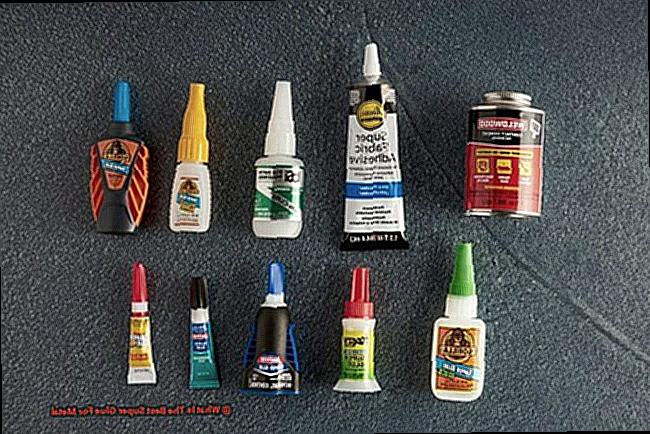
- Gorilla Super Glue Gel: This gel formula is a cut above the rest when it comes to metal bonding. Its thick consistency ensures precise application without any messy drips or runs. With its rapid drying time, you can swiftly move forward with your project, saving you valuable time.
- Loctite Ultra Gel Control Super Glue: Designed for bonding metals with uneven surfaces or gaps, this super glue is a true problem-solver. Its unique gel formula fills in gaps flawlessly, creating a strong bond that resists impact and moisture. The easy-to-use squeeze bottle guarantees accurate application every time.
- J-B Weld Original Cold-Weld Formula: If you’re in need of an industrial-strength adhesive, look no further than this powerhouse. It forms an unbreakable bond on various metals, including steel, aluminum, and brass. Its impressive heat resistance makes it ideal for automotive repairs where high temperatures are involved.
- 3M Scotch-Weld Epoxy Adhesive: Precision is paramount when it comes to metal bonding, and this epoxy adhesive delivers just that. Tailored specifically for metal applications, it boasts excellent adhesion to a wide range of metals and exhibits remarkable temperature resistance. Its extended working time allows for meticulous positioning before it sets.
When using super glues for metal bonding, safety precautions are essential. Always work in a well-ventilated area and protect your hands with gloves to avoid skin contact. Some super glues may emit fumes that can cause irritation or allergic reactions. Additionally, ensure proper surface preparation by thoroughly cleaning the metal and removing any rust or dirt.
Conclusion
In conclusion, selecting the best super glue for metal requires careful consideration of several important factors. First and foremost, it’s crucial to choose a super glue that is specifically designed for bonding non-porous metals with smooth surfaces like steel, aluminum, and copper. For porous metals such as cast iron or brass, it’s recommended to opt for adhesives specially formulated for those materials.
Proper surface preparation cannot be stressed enough. Before applying the super glue, ensure that the metal surface is thoroughly clean and free from any contaminants. Some metals may have unique coatings or finishes that can impact the adhesive’s ability to bond effectively. To avoid any mishaps, it’s advisable to conduct a small test on a discrete area before proceeding with the full application.
Strength and durability are paramount considerations when choosing a super glue for metal. Look for products with exceptional tensile strength and impact resistance to guarantee long-lasting bonds capable of enduring heavy loads and vibrations.
Temperature resistance is yet another crucial factor to bear in mind. Opt for a super glue that can withstand extreme temperatures without compromising its adhesive properties. This way, you can rest assured that your bonded metal pieces will remain securely joined regardless of the environmental conditions they encounter.
Drying time and curing process should align with your project requirements. If time is of the essence, consider opting for quick-drying and fast-curing glues suitable for time-sensitive projects. On the other hand, some projects may necessitate allowing more time for the adhesive to reach its maximum strength before subjecting it to stress or load.
Lastly, if your metal bonding endeavor involves joining metal pieces with other materials like plastic or glass, make sure that the chosen super glue is compatible with all these materials. Compatibility ensures a seamless bond between different substances without compromising their individual properties.
Taking into account these essential factors will lead you towards top-rated options in the realm of super glues for metal bonding. Brands such as Loctite Ultra Gel Control Super Glue, Gorilla Super Glue Gel, J-B Weld Original Cold-Weld Formula, and 3M Scotch-Weld Epoxy Adhesive consistently receive high praise for their performance and reliability.

